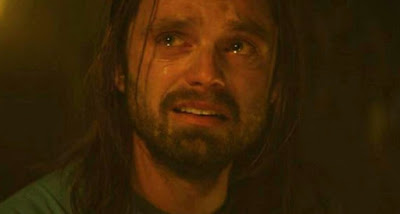Now that The Falcon and the Winter Soldier has concluded and enough time may have passed for most people to view it, I wanted to offer some thoughts on the show, as I did previously with WandaVision. Warning: there are spoilers and, as always, if you enjoy reading these reflections, you just might like my new book Religion and Myth in the Marvel Cinematic Universe, available on Amazon and discussed in detail in a previous post.
In contrast, I think a lot happened to mature the narrative and all its characters. We discovered the complicated and racially-charged history of the title "Captain America" through the story of Isaiah Bradley.
Bucky battled his Winter Soldier demons, providing a genuinely touching moment when we see him finally realize his mental Hydra programming has been eradicated.
From an earlier discomfort and antagonism, Sam and Bucky developed a genuine chemistry that I enjoyed.
Most of all, I thought that the entire point of the series was that Sam needed to go on the journey to claim the shield, that he could only become Captain America by taking the title, not just receiving it from Steve Rogers. When John Walker proves himself unworthy to possess the shield and Sam reclaims it, gingerly cleaning the blood away, the moment felt a little like Arthur taking Excalibur, the rightful owner of the object, the symbol, and the legacy finally inheriting his rightful due in full. Without that build up, struggle, and reckoning (which also involved the other episodes' investment in the racial over- and undercurrents), the last installment's revelation of Sam as the new Captain America would not have meant as much nor had the impact it did.
This particular theme of transition and the struggle of the successor to earn the mantle of the predecessor seems to be emerging as a defining characteristic of these Phase 4 installments. Spider-Man struggled with being Iron Man's de-facto heir in Spider-Man: Far From Home, temporarily relinquishing Stark's bequeathed technology when he believed he was not up to the task. Sam Wilson similarly gives up the shield at the beginning of The Falcon and the Winter Soldier, only to wrest it back from John Walker, with Bucky's help, of course. Will we see a similarly transition in Thor: Love and Thunder with Jane Foster becoming the new Thor?
Perhaps the best example is the portrayal and reception of the character Zemo. Previously seen as the antagonist in Captain America: Civil War, Zemo plays a role as a kind of anti-hero in the series. Opposed to the existence of all superheroes and super-soldiers due to the inherent tendency toward supremacy, Zemo provides a ruthless cynicism to the show and, through his financial means and charm as a Baron, a suave James Bond-like air. By some accounts, he represents the best aspect of the show and brief footage of him dancing in a Madripoor club went viral as a meme, leading to an extended hour-long mix you can watch here:
Despite the character's charm and, again, relatability of his motives, it shouldn't be forgotten that he has used whatever means necessary to achieve his ends, even killing innocents. With the impending release of a series on Loki, I have a feeling there will be even more ample opportunities to talk about this theme of ambiguity.
News was recently released about the possibility of a fourth Captain America film, presumably involving most or all of the main characters of the television show, which ended by changing the title from The Falcon and the Winter Soldier to Captain America and the Winter Soldier. I, for one, anxiously await such a film to see Sam and Bucky's journey continue.
I hope you enjoyed these reflections! Until the next time, take care.









No comments:
Post a Comment